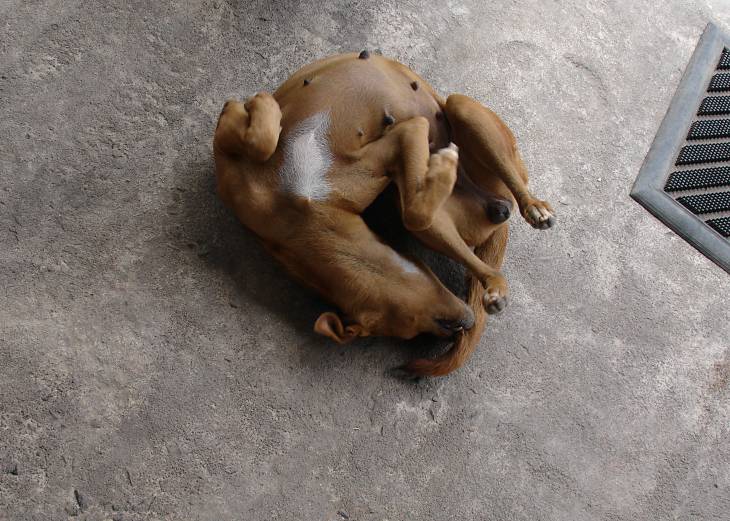Is your Dog Biting It’s Tail? (Reasons for This Behavior)
The tail is one of a dog’s most distinguishing features. Your dog may occasionally think of it as a convenient chew toy. However, if you catch your dog nipping, chewing, or biting it in a near-obsessive fashion, it could also be a distinctive clue to a potential health issue.
Why Do Dogs Bite Tails?
There are numerous reasons why your pooch may find his tail so entrancing. Boredom, anxiety, allergies and even his inherent predatory nature are all causes of this behavior, which is typically developed in the puppy stage. While it can be corrected with a bit of training, you may feel reluctant to do so if it’s an occasional activity, since the act of tail chasing that can proceed the biting can admittedly be cute.
Tail Biting Could Develop Into Something Bad
If tail biting isn't nipped in the bud, it could lead to a form of obsessive compulsive disorder. When this occurs, your dog will continue to chew on his tail until it becomes riddled with infections and bloody lacerations. In some rare cases, the resultant infections can become so bad, a dog may have to get his tail amputated.
If you catch your dog chasing or biting his tail, the best thing to do is monitor such behavior to make sure it’s not an irresistible act. If you just see it on rare occasions, it could just translate to an itch. However, it’s best that you train him if you notice the behavior is persistent.
A lot of the techniques you can deploy to stop tail chasing are done so to counteract some of the reasons why he’s biting his tail in the first place, such as boredom. For instance, you can increase his exercise regiment or provide him with mentally stimulating toys or games to stimulate his body and mind. You can also deploy basic training commands to calm him down if he's in the throes of pursuing his backside.
Make Sure It’s Not a Medical Issue

Not all instances of tail biting are due to your dog being obsessed with catching it in his mouth. It could be a sign of a wide range of medical issues. The tail biting could be something caused by an external influence, like an allergy or a flea infestation. It could also stem from something more severe issue, such as infected anal glands or a broken or fractured tail.
If you suspect that your dog’s tail biting is medical related, it’s wise to seek help from a veterinarian immediately. Your vet can perform a battery of tests to rule out various causes and to make pinpointing the actual issue easier. In some cases, your vet may order an x-ray to rule out breaks or fractures surrounding the tail area.
Depending on the actual diagnosis, you may have to provide your dog relief from tail biting through various medicines. These could be topical ointments, dewormers, or flea products that would need to be administered to your pooch as long as it’s on hand to apply or supply. In some cases, your pooch may have to wear an Elizabethan collar to help them refrain from tail chomping.
What if the Biting is Behavioral?
If you determine that your dog is medically sound and that his tail biting is behavioral in nature, don't despair. There are pet therapists that you can consult to help your pooch cope and overcome his issue. Doing so may unearth a deep-seeded problem; one in which the tail biting is judged to be symptomatic.
You shouldn’t assume this route - always go to your vet first. You should also prep yourself to be in for the long haul, as providing proper therapy takes time and effort. However, if the results culminate in your pooch ceasing to attack his tail, it’s safe to say that it’s time and effort well spent.
Be Sure to Give Your Buddy Lots of Love!
If your dog bites his tail, make sure it’s nothing medically or behaviorally concerting. If it is, show him as much love and support as you can throughout the process. He may not be able to say “thank you,” but it’s safe to assume that’s the sentiment he’ll have in his heart when all things are said and done.

